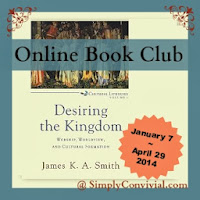
See what others are saying about this chapter over at Simply Convivial. Mystie is doing a great job helping us to continue on in a book that isn't always what we bargained for!
He starts the next section of chapter 4 talking about degrees. He argues that people might take the idea of sacramentalism too far in one of two ways. The first is that they might say that the church is unnecessary because if God is everywhere then we can worship wherever we want. Well you can, but Jesus is also pretty clear about being in community to remember him specifically. If you read the Old Testament, you realize that God does have a particular way he wants to be worshiped. We aren't under those same laws but we still worship the same God who desired that order of worship so that we could better understand who He is and the sacrifice He made. I think the same could be said going forward, that certain communal acts do help us worship in ways that are most fitting.
The second approach is to break worship down into something that we do, as only an embodied approach to life, like developing as an athlete. Here it becomes an act devoid of Spirit and it becomes more like a good luck ritual. If I do these things then I will grow - with no view to the bigger picture. This makes me think of the person who shows up on Sunday to get "brownie points" with God. They figure that as long as they are there they are covered.
I do like his concluding thoughts in this chapter. He reminds us of this essential issue
The point of worship is not formation; rather, formation is an overflow effect of our encounter with the Redeemer in praise and prayer, adoration and communion.
Worship is about God and for God.I am glad that he circles around this point again because I think in so many ways we make worship about us, our needs, convenience, comfort level, etc. I keep thinking back to his earlier comment that after all of our head knowledge and thinking about issues people might be surprised that our primary call as Christians is to worship. From there James outlines many different ways that we can skew worship - as mainly about a "message", a "refueling event", or for "evangelism and outreach". He contests that
While we might be inclined to think of this as a way to update worship and make it contemporary, my concern is that in the process we lose key aspects of formation and discipleship.I expect that the next chapter will talk about this extensively. On a smaller scale it is similar to when I pray ACTS (Adoration, Confession, Thanksgiving and Supplication) with my children. If we don't follow that form we are likely to give thanks and ask for things and maybe confess. However, with the form we put things in right order and begin by remember who God is "Our Father in Heaven". The form helps us to remember that it is about Him - not about us.
I am so glad that he also made this point
We also lose a sense that worship is a "work of the people" - that the "work of praise" is something we can only do as a people who are an eschatological foretaste of the coming kingdom of God.I think we are so used to my prayer life, my walk, my faith, my favorite praise songs that we forget that He sees us as a people and that he desires and calls us to gather together as His people. I was struck by this theme as I read N.T. Wright's After you Believe: Why Christian Character Matters. In it, Wright shows that one of the key differences between Christian virtues and the Roman virtues was that these virtues were to be built and shown in community. Roman virtues were all about the man (vir). But Christian character is fundamentally about the "one anothers" in community. We need to be connected to the body of Christ through our forms of worship and as we physically draw together to worship.
I look forward to his discussion of these forms - I think we might finally get there!

"Worship is about God and for God"
ReplyDeleteYes! I just recently read a passage in Paradise Lost when Adam talks about his reaction when he first became aware that he was alive and he speaks to the world around him saying,
"Tell me, how may I know him [my maker], how adore,
From whom I have that thus I move and live,
And feel that I am happier than I know."
It really stood out to me because I had been thinking recently about this very thing, and how worship in spirit and truth is a turning toward God and a forgetting of self. And that very turning toward Him also implies a turning toward my brother because the overflow of love needs an outlet. I think I have a blog post brewing here... :)